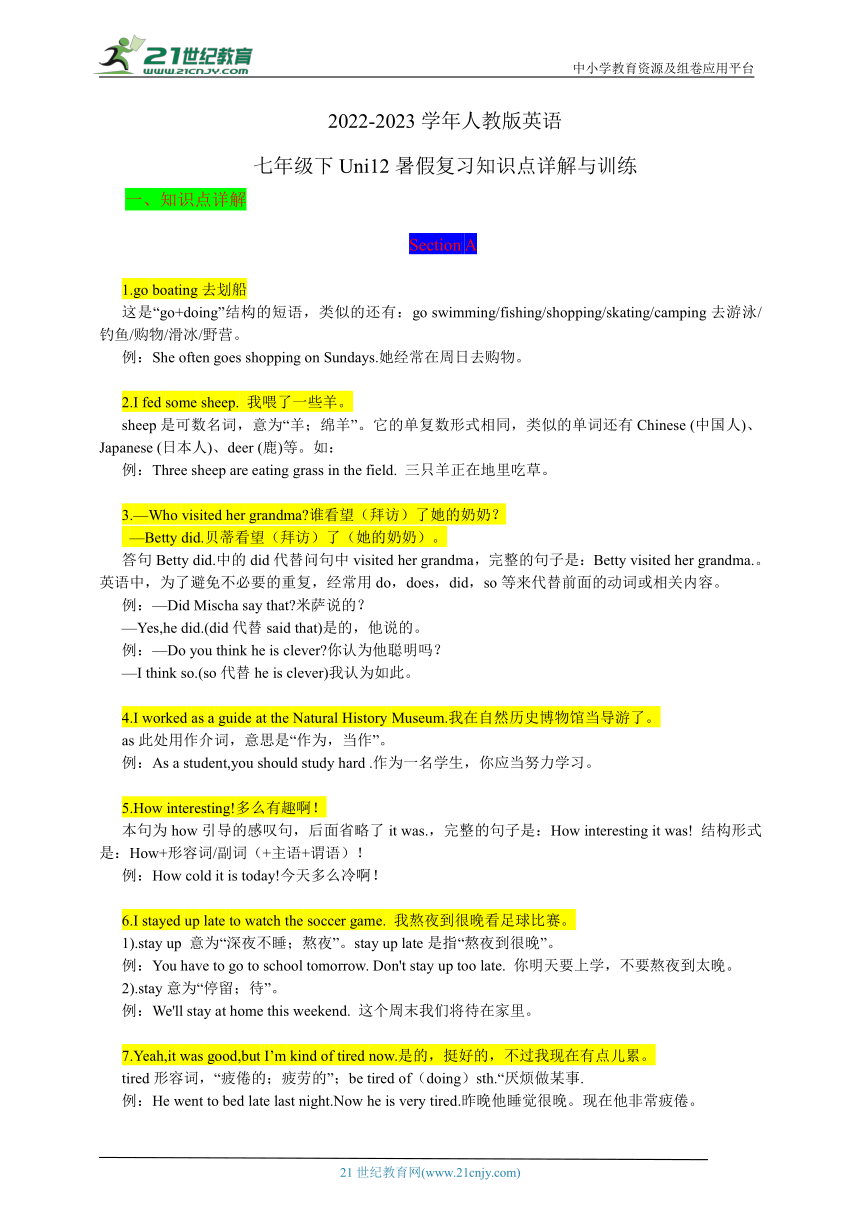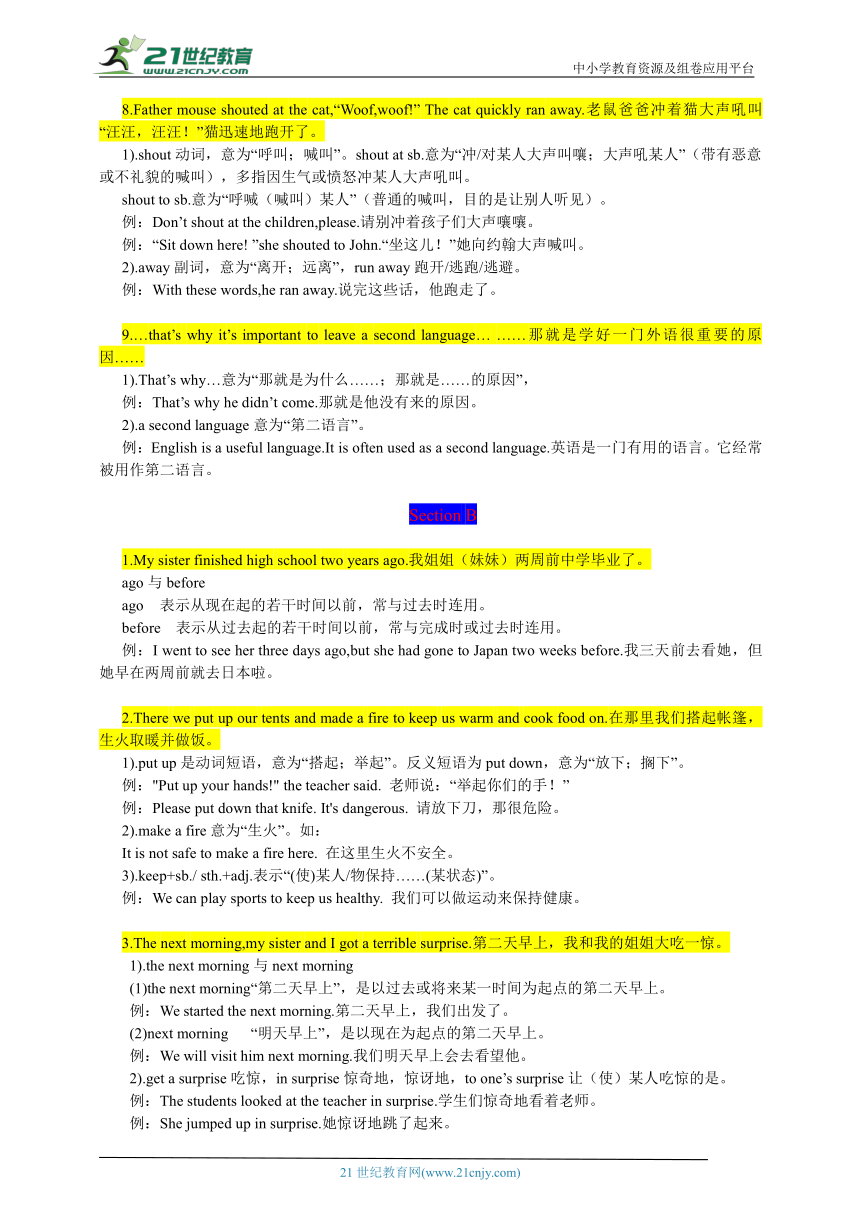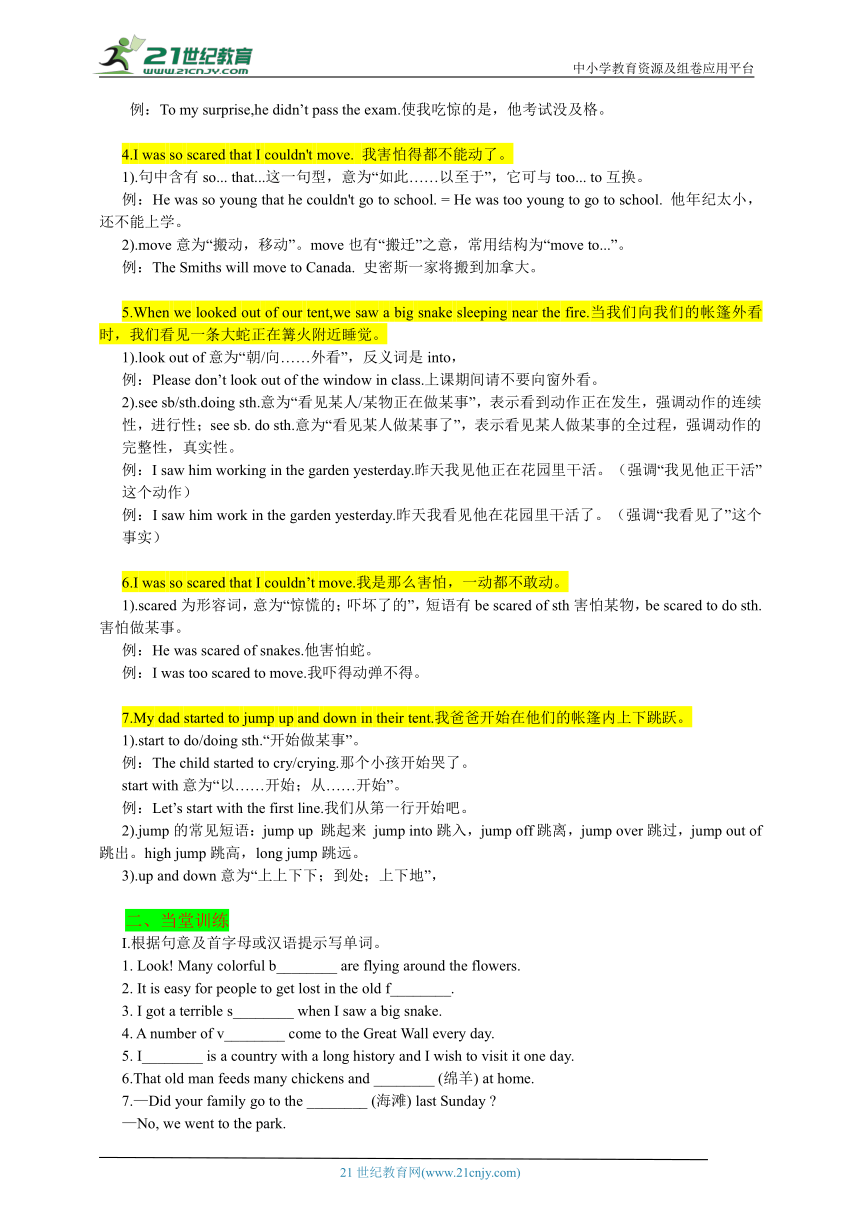【暑假学案】Unit 12 What did you do last weekend? 暑假复习知识点详解与训练(人教版英语七年级下)
文档属性
| 名称 | 【暑假学案】Unit 12 What did you do last weekend? 暑假复习知识点详解与训练(人教版英语七年级下) |

|
|
| 格式 | doc | ||
| 文件大小 | 1.2MB | ||
| 资源类型 | 试卷 | ||
| 版本资源 | 人教新目标(Go for it)版 | ||
| 科目 | 英语 | ||
| 更新时间 | 2023-07-18 15:47:35 | ||
图片预览



文档简介
中小学教育资源及组卷应用平台
2022-2023学年人教版英语
七年级下Uni12暑假复习知识点详解与训练
一、知识点详解
Section A
1.go boating去划船
这是“go+doing”结构的短语,类似的还有:go swimming/fishing/shopping/skating/camping去游泳/钓鱼/购物/滑冰/野营。
例:She often goes shopping on Sundays.她经常在周日去购物。
2.I fed some sheep. 我喂了一些羊。
sheep是可数名词,意为“羊;绵羊”。它的单复数形式相同,类似的单词还有Chinese (中国人)、Japanese (日本人)、deer (鹿)等。如:
例:Three sheep are eating grass in the field. 三只羊正在地里吃草。
3.—Who visited her grandma 谁看望(拜访)了她的奶奶?
—Betty did.贝蒂看望(拜访)了(她的奶奶)。
答句Betty did.中的did代替问句中visited her grandma,完整的句子是:Betty visited her grandma.。英语中,为了避免不必要的重复,经常用do,does,did,so等来代替前面的动词或相关内容。
例:—Did Mischa say that 米萨说的?
—Yes,he did.(did代替said that)是的,他说的。
例:—Do you think he is clever 你认为他聪明吗?
—I think so.(so代替he is clever)我认为如此。
4.I worked as a guide at the Natural History Museum.我在自然历史博物馆当导游了。
as此处用作介词,意思是“作为,当作”。
例:As a student,you should study hard .作为一名学生,你应当努力学习。
5.How interesting!多么有趣啊!
本句为how引导的感叹句,后面省略了it was.,完整的句子是:How interesting it was! 结构形式是:How+形容词/副词(+主语+谓语)!
例:How cold it is today!今天多么冷啊!
6.I stayed up late to watch the soccer game. 我熬夜到很晚看足球比赛。
1).stay up 意为“深夜不睡;熬夜”。stay up late是指“熬夜到很晚”。
例:You have to go to school tomorrow. Don't stay up too late. 你明天要上学,不要熬夜到太晚。
2).stay意为“停留;待”。
例:We'll stay at home this weekend. 这个周末我们将待在家里。
7.Yeah,it was good,but I’m kind of tired now.是的,挺好的,不过我现在有点儿累。
tired形容词,“疲倦的;疲劳的”;be tired of(doing)sth.“厌烦做某事.
例:He went to bed late last night.Now he is very tired.昨晚他睡觉很晚。现在他非常疲倦。
8.Father mouse shouted at the cat,“Woof,woof!” The cat quickly ran away.老鼠爸爸冲着猫大声吼叫“汪汪,汪汪!”猫迅速地跑开了。
1).shout动词,意为“呼叫;喊叫”。shout at sb.意为“冲/对某人大声叫嚷;大声吼某人”(带有恶意或不礼貌的喊叫),多指因生气或愤怒冲某人大声吼叫。
shout to sb.意为“呼喊(喊叫)某人”(普通的喊叫,目的是让别人听见)。
例:Don’t shout at the children,please.请别冲着孩子们大声嚷嚷。
例:“Sit down here! ”she shouted to John.“坐这儿!”她向约翰大声喊叫。
2).away副词,意为“离开;远离”,run away跑开/逃跑/逃避。
例:With these words,he ran away.说完这些话,他跑走了。
9.…that’s why it’s important to leave a second language… ……那就是学好一门外语很重要的原因……
1).That’s why…意为“那就是为什么……;那就是……的原因”,
例:That’s why he didn’t come.那就是他没有来的原因。
2).a second language意为“第二语言”。
例:English is a useful language.It is often used as a second language.英语是一门有用的语言。它经常被用作第二语言。
Section B
1.My sister finished high school two years ago.我姐姐(妹妹)两周前中学毕业了。
ago与before
ago 表示从现在起的若干时间以前,常与过去时连用。
before 表示从过去起的若干时间以前,常与完成时或过去时连用。
例:I went to see her three days ago,but she had gone to Japan two weeks before.我三天前去看她,但她早在两周前就去日本啦。
2.There we put up our tents and made a fire to keep us warm and cook food on.在那里我们搭起帐篷,生火取暖并做饭。
1).put up是动词短语,意为“搭起;举起”。反义短语为put down,意为“放下;搁下”。
例:"Put up your hands!" the teacher said. 老师说:“举起你们的手!”
例:Please put down that knife. It's dangerous. 请放下刀,那很危险。
2).make a fire意为“生火”。如:
It is not safe to make a fire here. 在这里生火不安全。
3).keep+sb./ sth.+adj.表示“(使)某人/物保持……(某状态)”。
例:We can play sports to keep us healthy. 我们可以做运动来保持健康。
3.The next morning,my sister and I got a terrible surprise.第二天早上,我和我的姐姐大吃一惊。
1).the next morning与next morning
(1)the next morning “第二天早上”,是以过去或将来某一时间为起点的第二天早上。
例:We started the next morning.第二天早上,我们出发了。
(2)next morning “明天早上”,是以现在为起点的第二天早上。
例:We will visit him next morning.我们明天早上会去看望他。
2).get a surprise吃惊,in surprise惊奇地,惊讶地,to one’s surprise让(使)某人吃惊的是。
例:The students looked at the teacher in surprise.学生们惊奇地看着老师。
例:She jumped up in surprise.她惊讶地跳了起来。
例:To my surprise,he didn’t pass the exam.使我吃惊的是,他考试没及格。
4.I was so scared that I couldn't move. 我害怕得都不能动了。
1).句中含有so... that...这一句型,意为“如此……以至于”,它可与too... to互换。
例:He was so young that he couldn't go to school. = He was too young to go to school. 他年纪太小,还不能上学。
2).move意为“搬动,移动”。move也有“搬迁”之意,常用结构为“move to...”。
例:The Smiths will move to Canada. 史密斯一家将搬到加拿大。
5.When we looked out of our tent,we saw a big snake sleeping near the fire.当我们向我们的帐篷外看时,我们看见一条大蛇正在篝火附近睡觉。
1).look out of意为“朝/向……外看”,反义词是into,
例:Please don’t look out of the window in class.上课期间请不要向窗外看。
2).see sb/sth.doing sth.意为“看见某人/某物正在做某事”,表示看到动作正在发生,强调动作的连续性,进行性;see sb. do sth.意为“看见某人做某事了”,表示看见某人做某事的全过程,强调动作的完整性,真实性。
例:I saw him working in the garden yesterday.昨天我见他正在花园里干活。(强调“我见他正干活”这个动作)
例:I saw him work in the garden yesterday.昨天我看见他在花园里干活了。(强调“我看见了”这个事实)
6.I was so scared that I couldn’t move.我是那么害怕,一动都不敢动。
1).scared为形容词,意为“惊慌的;吓坏了的”,短语有be scared of sth害怕某物,be scared to do sth.害怕做某事。
例:He was scared of snakes.他害怕蛇。
例:I was too scared to move.我吓得动弹不得。
7.My dad started to jump up and down in their tent.我爸爸开始在他们的帐篷内上下跳跃。
1).start to do/doing sth.“开始做某事”。
例:The child started to cry/crying.那个小孩开始哭了。
start with意为“以……开始;从……开始”。
例:Let’s start with the first line.我们从第一行开始吧。
2).jump的常见短语:jump up 跳起来 jump into跳入,jump off跳离,jump over跳过,jump out of跳出。high jump跳高,long jump跳远。
3).up and down意为“上上下下;到处;上下地”,
二、当堂训练
I.根据句意及首字母或汉语提示写单词。
1. Look! Many colorful b________ are flying around the flowers.
2. It is easy for people to get lost in the old f________.
3. I got a terrible s________ when I saw a big snake.
4. A number of v________ come to the Great Wall every day.
5. I________ is a country with a long history and I wish to visit it one day.
6.That old man feeds many chickens and ________ (绵羊) at home.
7.—Did your family go to the ________ (海滩) last Sunday
—No, we went to the park.
8. My mother visited the Natural History Museum and a ________ (语言) school last month .
9. They are on vacation in ________ (加拿大).
10. He stayed up late last night, don’t ________ him up (弄醒).
II.用所给单词的适当形式填空。
1. There are many ________ (sheep) in the farm.
2. There are lots of ________ (butterfly) flying in the garden.
3. He worked as a guide in the ________ (nature) History Museum .
4. It is important to learn a ________ (two) language.
5. We sat under the moon and told ________ (story).
6. She was so ________ (scary) that she couldn’t move.
7. It was a very ________ (use) lesson for me.
8. She swam in the ________ (swim) pool yesterday.
9. Did you do ________ (something) interesting yesterday
10. A family of ________ (mouse) were in the kitchen in the morning.
III.单项选择。
1. Cindy starts ________ the piano at 7 p.m. every day.
A. practice B. to practice C. practiced D. to practicing
2. I saw Dale ________ in the river on my way home.
A. swims B. to swim C. swimming D. to swimming
3. —________ did Linda find her English dictionary
—In the library.
A. How B. Where C. When D. Why
4. —________ your mom at home today
—Yes, but she ________ yesterday.
A. Was; wasn’t B. Is; isn’t C. Was; isn’t D. Is; wasn’t
5. —How interesting the boat race is!
—________.
A. Sounds good B. Yeah, it is fun C. Lucky you D. Great, thanks
6. Bill, do you know who is the first man to walk on ________ moon
A. a B. an C. the D. 不填
7. Mr. Miller worked ________ a guide in New York two years ago.
A. with B. as C. of D. on
8. Tom always listens to me with only half a(n) ________ when he watches TV.
A. mouth B. nose C. eye D. ear
9. The bookcase is too ________ for little Tom. He can’t put the book in it.
A. long B. small C. high D. short
10. Molly is ________ after walking 10 kilometers. She needs a good sleep.
A. tired B. busy C. strict D. quiet
IV.翻译。
1. 山上有多少只羊?
How many ________ ________ ________ on the hill
2. 作为一名教师,你应该教好学生。
________ ________ ________, you should teach your students well.
3. 她喜欢所有天然的东西。
She likes ________ ________.
4. 我不想在这个旅馆停留。
I don't want to ________ ________ ________ ________.
5. 这本书很棒,我爱不释手。
The book is very great. I can't________ ________ ________.
6. 我们在教室里应该保持安静。
We should ________ ________ in the classroom.
7. 王老师很严厉,很多学生都不想和他交谈。
Mr. Wang is ________ ________ ________ many students don't want to talk with him.
8. 不要移动我桌子上的东西。
________ ________ the things on my table.
9. 我从昨天开始看这本书。
I ________ ________ ________ yesterday.
10. 他从一个窗口跳了出去。
He ________ ________ ________ a window.
答案
I.1. butterflies 2. forest 3. surprise 4. visitors 5. India
6.sheep 7.beach 8.language 9.Canada 10.wake
II.1. sheep 2. butterflies 3. Natural 4. second 5. stories
6. scared 7. useful 8. swimming 9. anything 10. mice
III. 1-5BCBDB 6-10 CBDCA
IV.1. sheep are there 2. As a teacher 3. everything natural 4. stay in the hotel
5. put it down 6. keep quiet 7. so strict that 8. Don't move
9. started the book 10. jumped out of
21世纪教育网 www.21cnjy.com 精品试卷·第 2 页 (共 2 页)
HYPERLINK "http://21世纪教育网(www.21cnjy.com)
" 21世纪教育网(www.21cnjy.com)
2022-2023学年人教版英语
七年级下Uni12暑假复习知识点详解与训练
一、知识点详解
Section A
1.go boating去划船
这是“go+doing”结构的短语,类似的还有:go swimming/fishing/shopping/skating/camping去游泳/钓鱼/购物/滑冰/野营。
例:She often goes shopping on Sundays.她经常在周日去购物。
2.I fed some sheep. 我喂了一些羊。
sheep是可数名词,意为“羊;绵羊”。它的单复数形式相同,类似的单词还有Chinese (中国人)、Japanese (日本人)、deer (鹿)等。如:
例:Three sheep are eating grass in the field. 三只羊正在地里吃草。
3.—Who visited her grandma 谁看望(拜访)了她的奶奶?
—Betty did.贝蒂看望(拜访)了(她的奶奶)。
答句Betty did.中的did代替问句中visited her grandma,完整的句子是:Betty visited her grandma.。英语中,为了避免不必要的重复,经常用do,does,did,so等来代替前面的动词或相关内容。
例:—Did Mischa say that 米萨说的?
—Yes,he did.(did代替said that)是的,他说的。
例:—Do you think he is clever 你认为他聪明吗?
—I think so.(so代替he is clever)我认为如此。
4.I worked as a guide at the Natural History Museum.我在自然历史博物馆当导游了。
as此处用作介词,意思是“作为,当作”。
例:As a student,you should study hard .作为一名学生,你应当努力学习。
5.How interesting!多么有趣啊!
本句为how引导的感叹句,后面省略了it was.,完整的句子是:How interesting it was! 结构形式是:How+形容词/副词(+主语+谓语)!
例:How cold it is today!今天多么冷啊!
6.I stayed up late to watch the soccer game. 我熬夜到很晚看足球比赛。
1).stay up 意为“深夜不睡;熬夜”。stay up late是指“熬夜到很晚”。
例:You have to go to school tomorrow. Don't stay up too late. 你明天要上学,不要熬夜到太晚。
2).stay意为“停留;待”。
例:We'll stay at home this weekend. 这个周末我们将待在家里。
7.Yeah,it was good,but I’m kind of tired now.是的,挺好的,不过我现在有点儿累。
tired形容词,“疲倦的;疲劳的”;be tired of(doing)sth.“厌烦做某事.
例:He went to bed late last night.Now he is very tired.昨晚他睡觉很晚。现在他非常疲倦。
8.Father mouse shouted at the cat,“Woof,woof!” The cat quickly ran away.老鼠爸爸冲着猫大声吼叫“汪汪,汪汪!”猫迅速地跑开了。
1).shout动词,意为“呼叫;喊叫”。shout at sb.意为“冲/对某人大声叫嚷;大声吼某人”(带有恶意或不礼貌的喊叫),多指因生气或愤怒冲某人大声吼叫。
shout to sb.意为“呼喊(喊叫)某人”(普通的喊叫,目的是让别人听见)。
例:Don’t shout at the children,please.请别冲着孩子们大声嚷嚷。
例:“Sit down here! ”she shouted to John.“坐这儿!”她向约翰大声喊叫。
2).away副词,意为“离开;远离”,run away跑开/逃跑/逃避。
例:With these words,he ran away.说完这些话,他跑走了。
9.…that’s why it’s important to leave a second language… ……那就是学好一门外语很重要的原因……
1).That’s why…意为“那就是为什么……;那就是……的原因”,
例:That’s why he didn’t come.那就是他没有来的原因。
2).a second language意为“第二语言”。
例:English is a useful language.It is often used as a second language.英语是一门有用的语言。它经常被用作第二语言。
Section B
1.My sister finished high school two years ago.我姐姐(妹妹)两周前中学毕业了。
ago与before
ago 表示从现在起的若干时间以前,常与过去时连用。
before 表示从过去起的若干时间以前,常与完成时或过去时连用。
例:I went to see her three days ago,but she had gone to Japan two weeks before.我三天前去看她,但她早在两周前就去日本啦。
2.There we put up our tents and made a fire to keep us warm and cook food on.在那里我们搭起帐篷,生火取暖并做饭。
1).put up是动词短语,意为“搭起;举起”。反义短语为put down,意为“放下;搁下”。
例:"Put up your hands!" the teacher said. 老师说:“举起你们的手!”
例:Please put down that knife. It's dangerous. 请放下刀,那很危险。
2).make a fire意为“生火”。如:
It is not safe to make a fire here. 在这里生火不安全。
3).keep+sb./ sth.+adj.表示“(使)某人/物保持……(某状态)”。
例:We can play sports to keep us healthy. 我们可以做运动来保持健康。
3.The next morning,my sister and I got a terrible surprise.第二天早上,我和我的姐姐大吃一惊。
1).the next morning与next morning
(1)the next morning “第二天早上”,是以过去或将来某一时间为起点的第二天早上。
例:We started the next morning.第二天早上,我们出发了。
(2)next morning “明天早上”,是以现在为起点的第二天早上。
例:We will visit him next morning.我们明天早上会去看望他。
2).get a surprise吃惊,in surprise惊奇地,惊讶地,to one’s surprise让(使)某人吃惊的是。
例:The students looked at the teacher in surprise.学生们惊奇地看着老师。
例:She jumped up in surprise.她惊讶地跳了起来。
例:To my surprise,he didn’t pass the exam.使我吃惊的是,他考试没及格。
4.I was so scared that I couldn't move. 我害怕得都不能动了。
1).句中含有so... that...这一句型,意为“如此……以至于”,它可与too... to互换。
例:He was so young that he couldn't go to school. = He was too young to go to school. 他年纪太小,还不能上学。
2).move意为“搬动,移动”。move也有“搬迁”之意,常用结构为“move to...”。
例:The Smiths will move to Canada. 史密斯一家将搬到加拿大。
5.When we looked out of our tent,we saw a big snake sleeping near the fire.当我们向我们的帐篷外看时,我们看见一条大蛇正在篝火附近睡觉。
1).look out of意为“朝/向……外看”,反义词是into,
例:Please don’t look out of the window in class.上课期间请不要向窗外看。
2).see sb/sth.doing sth.意为“看见某人/某物正在做某事”,表示看到动作正在发生,强调动作的连续性,进行性;see sb. do sth.意为“看见某人做某事了”,表示看见某人做某事的全过程,强调动作的完整性,真实性。
例:I saw him working in the garden yesterday.昨天我见他正在花园里干活。(强调“我见他正干活”这个动作)
例:I saw him work in the garden yesterday.昨天我看见他在花园里干活了。(强调“我看见了”这个事实)
6.I was so scared that I couldn’t move.我是那么害怕,一动都不敢动。
1).scared为形容词,意为“惊慌的;吓坏了的”,短语有be scared of sth害怕某物,be scared to do sth.害怕做某事。
例:He was scared of snakes.他害怕蛇。
例:I was too scared to move.我吓得动弹不得。
7.My dad started to jump up and down in their tent.我爸爸开始在他们的帐篷内上下跳跃。
1).start to do/doing sth.“开始做某事”。
例:The child started to cry/crying.那个小孩开始哭了。
start with意为“以……开始;从……开始”。
例:Let’s start with the first line.我们从第一行开始吧。
2).jump的常见短语:jump up 跳起来 jump into跳入,jump off跳离,jump over跳过,jump out of跳出。high jump跳高,long jump跳远。
3).up and down意为“上上下下;到处;上下地”,
二、当堂训练
I.根据句意及首字母或汉语提示写单词。
1. Look! Many colorful b________ are flying around the flowers.
2. It is easy for people to get lost in the old f________.
3. I got a terrible s________ when I saw a big snake.
4. A number of v________ come to the Great Wall every day.
5. I________ is a country with a long history and I wish to visit it one day.
6.That old man feeds many chickens and ________ (绵羊) at home.
7.—Did your family go to the ________ (海滩) last Sunday
—No, we went to the park.
8. My mother visited the Natural History Museum and a ________ (语言) school last month .
9. They are on vacation in ________ (加拿大).
10. He stayed up late last night, don’t ________ him up (弄醒).
II.用所给单词的适当形式填空。
1. There are many ________ (sheep) in the farm.
2. There are lots of ________ (butterfly) flying in the garden.
3. He worked as a guide in the ________ (nature) History Museum .
4. It is important to learn a ________ (two) language.
5. We sat under the moon and told ________ (story).
6. She was so ________ (scary) that she couldn’t move.
7. It was a very ________ (use) lesson for me.
8. She swam in the ________ (swim) pool yesterday.
9. Did you do ________ (something) interesting yesterday
10. A family of ________ (mouse) were in the kitchen in the morning.
III.单项选择。
1. Cindy starts ________ the piano at 7 p.m. every day.
A. practice B. to practice C. practiced D. to practicing
2. I saw Dale ________ in the river on my way home.
A. swims B. to swim C. swimming D. to swimming
3. —________ did Linda find her English dictionary
—In the library.
A. How B. Where C. When D. Why
4. —________ your mom at home today
—Yes, but she ________ yesterday.
A. Was; wasn’t B. Is; isn’t C. Was; isn’t D. Is; wasn’t
5. —How interesting the boat race is!
—________.
A. Sounds good B. Yeah, it is fun C. Lucky you D. Great, thanks
6. Bill, do you know who is the first man to walk on ________ moon
A. a B. an C. the D. 不填
7. Mr. Miller worked ________ a guide in New York two years ago.
A. with B. as C. of D. on
8. Tom always listens to me with only half a(n) ________ when he watches TV.
A. mouth B. nose C. eye D. ear
9. The bookcase is too ________ for little Tom. He can’t put the book in it.
A. long B. small C. high D. short
10. Molly is ________ after walking 10 kilometers. She needs a good sleep.
A. tired B. busy C. strict D. quiet
IV.翻译。
1. 山上有多少只羊?
How many ________ ________ ________ on the hill
2. 作为一名教师,你应该教好学生。
________ ________ ________, you should teach your students well.
3. 她喜欢所有天然的东西。
She likes ________ ________.
4. 我不想在这个旅馆停留。
I don't want to ________ ________ ________ ________.
5. 这本书很棒,我爱不释手。
The book is very great. I can't________ ________ ________.
6. 我们在教室里应该保持安静。
We should ________ ________ in the classroom.
7. 王老师很严厉,很多学生都不想和他交谈。
Mr. Wang is ________ ________ ________ many students don't want to talk with him.
8. 不要移动我桌子上的东西。
________ ________ the things on my table.
9. 我从昨天开始看这本书。
I ________ ________ ________ yesterday.
10. 他从一个窗口跳了出去。
He ________ ________ ________ a window.
答案
I.1. butterflies 2. forest 3. surprise 4. visitors 5. India
6.sheep 7.beach 8.language 9.Canada 10.wake
II.1. sheep 2. butterflies 3. Natural 4. second 5. stories
6. scared 7. useful 8. swimming 9. anything 10. mice
III. 1-5BCBDB 6-10 CBDCA
IV.1. sheep are there 2. As a teacher 3. everything natural 4. stay in the hotel
5. put it down 6. keep quiet 7. so strict that 8. Don't move
9. started the book 10. jumped out of
21世纪教育网 www.21cnjy.com 精品试卷·第 2 页 (共 2 页)
HYPERLINK "http://21世纪教育网(www.21cnjy.com)
" 21世纪教育网(www.21cnjy.com)
同课章节目录
- Unit 1 Can you play the guitar?
- Section A
- Section B
- Unit 2 What time do you go to school?
- Section A
- Section B
- Unit 3 How do you get to school?
- Section A
- Section B
- Unit 4 Don't eat in class.
- Section A
- Section B
- Unit 5 Why do you like pandas?
- Section A
- Section B
- Unit 6 I'm watching TV.
- Section A
- Section B
- Review of Units 1-6
- Unit 7 It's raining!
- Section A
- Section B
- Unit 8 Is there a post office near here?
- Section A
- Section B
- Unit 9 What does he look like?
- Section A
- Section B
- Unit 10 I'd like some noodles.
- Section A
- Section B
- Unit 11 How was your school trip?
- Section A
- Section B
- Unit 12 What did you do last weekend?
- Section A
- Section B
